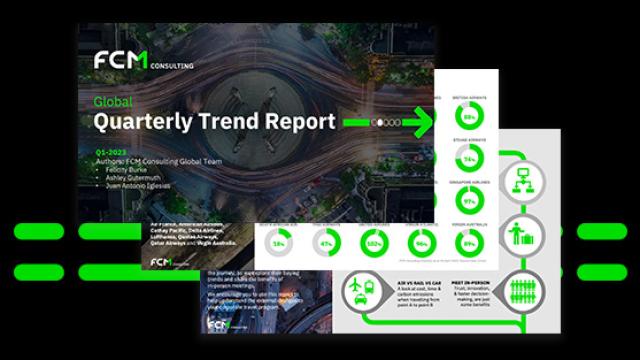INSIGHTS
Keeping control of business travel costs
Many travel buyers are still largely focused on how they can reduce business travel costs. With a year’s worth of new corporate travel data to use and concerns about higher prices driven by factors like inflation and oil costs, it’s not just individuals focused on the cost of living, but many organizations too.
As part of FCM’s Th!nk series, we put forward questions to FCM Consulting to learn how travel buyers can adapt their strategy and supply chain to the travel cost increase in 2023. Listen to their views on key strategies as many look to reign in those business travel expenses.
You’ll hear from
-
Jo Lloyd, Global Head of Account Management and FCM Consulting
-
Florian Mueller, Global Air Practice Lead
-
Ashley Gutermuth, Director of Consulting Services, Americas
-
Glenn Thorsen, Global Sustainability Lead
-
Juan Antonio Iglesias, Director of Consulting Services, EMEA
On cost and volatility
Juan encourages travel buyers to “prepare for the worst” with their travel sourcing strategies, as travel prices increase. He discusses whether there is stability at pre-pandemic levels, and how factors such as inflation are having an impact on airlines and hotels.
Client example: An infrastructure firm found its purchasing power diminish after a merger, and prior year negotiating rates were unavailable for comparative purposes. After undertaking a situational analysis and creating a strategy and recommendations, FCM Consulting designed a bespoke programme for the client that addressed its challenges and unique requirements, such as accommodation in remote locations. When implemented, the client had access to accommodation providers not available in the corporate market (a first in the market!), seven new chain agreements covering 6,000+ properties, which accrued to savings of 11.5% and program cost avoidance of 16.7%.
On supplier contracting
With the cost of business travel rising in 2023, Ashley Gutermuth and Florian Mueller share their recommendations on what travel buyers and procurement leaders should be doing to contain costs in their hotel programs and air travel programs.
Client example: An Australian government enterprise was concerned that the amount of leakage in hotel bookings was causing them to have uncompetitive rates and reduced negotiation power. With the help of the team and a well-timed RFP launch, the organization now sees 100% of hotels booked through the TMC, saving 16.2% in the first quarter of the program running.
On knowing what data works
When there’s so much data out there, how do you know which metrics to really listen to, and which ones to action? Juan shares his thoughts about using data for travel plans.
Client example: An agricultural business didn’t have a clear picture of their hotel expense, and without a managed travel program were exposed to risks such as duty of care concerns, booking efficiency, and compliance issues. Off the back of FCM Consulting’s data-driven research, analysis, and recommendations, the client consolidated and cleansed its travel, expense, and credit card data. This, alongside a hotel program diagnostic, saved the client more than 20%.
Top takeaways
Our panel share their key advice that travel buyers should focus on in 2023. Hear their top tips on airline and hotel contracting, sustainability budgets, and revisiting travel programs.


